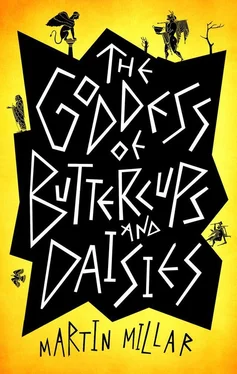Luxos bade the sparrow a cheery farewell and carried on. After some more arduous scrambling, he finally emerged in an area of green woodland, where the slope was much more gentle.
This looks like the place, he thought. Metris said she’d meet me here.
There was no sign of the nymph, though he did think he glimpsed a centaur through the trees. Luxos took a few steps forward and suddenly found Metris right in front of him, smiling. He wasn’t sure if she’d stepped out from a behind a tree, or just materialised out of thin air.
‘Luxos.’ Metris threw her arms around him, and they kissed. ‘You found me!’
‘I followed your directions.’
‘Some people can’t get here, even with directions.’
She kissed him again.
‘It’s so good to see you, Lux,’ she said, using her pet name for the young poet. She took his hand and led him along a path between the trees. Flowers grew along the edges of the path, the richest, most colourful flowers Luxos had ever seen.
‘It’s so exciting! My temple’s been repaired!’
‘Really?’
Metris nodded enthusiastically. ‘Workmen arrived saying Hephaistos had sent them because the Goddess Athena asked him to arrange some building work for her. I just moved in with the naiads for a few days and when I came back the temple was all fixed up, it’s really lovely! It’s better than ever, they’ve made it so nice and comfy. Look!’
They rounded a corner. Metris’s small temple had been completely renovated. More than that, it had been upgraded. Pillars, previously of grey stone, were now gleaming marble, and there was a finely chiselled statue of the Goddess Athena on the portico. Metris waved cheerfully to the statue. Above the door was an inscription.
TEMPLE OF METRIS
(JUNIOR) GODDESS OF BUTTERCUPS AND DAISIES
‘Isn’t it lovely?’ said Metris. Her youthful face lit up as she surveyed her renovated home. ‘And they made me a goddess. Well, a junior goddess anyway. I expect you just have to wait a while before you get promoted.’
Inside the temple there were two shrines. The larger, in the middle, featured another statue of Athena.
‘So I can talk to her any time I want. Bremusa said they’d be pleased to hear from me whenever I felt like a chat. She was a lot happier the last time I spoke to her.’
At the back of the main room was a smaller shrine, dedicated to the spirit of nymphs everywhere.
‘I thought that was a nice gesture,’ said Metris. ‘It’s time we got the recognition we deserve. And look, they took care of all the details.’ She opened a cabinet door, revealing several large amphoras full of wine.
‘Enough for libations, with plenty left over for me.’
The rear of the temple had been renovated, extended and remodelled into new living quarters. In a very comfortable room, full of quilts and cushions, Luxos and Metris drank a little wine, lay down together and gazed into each other’s eyes.
Acropolis
An ancient citadel located on a high rocky outcrop above the city of Athens. Site of the Parthenon, the Temple of Athena Nike, and other public buildings. The temples of the Acropolis were destroyed by the Persians in 480 BC, and rebuilt under the leadership of the Athenian statesman Pericles.
Agora
Open space in Greek city, used for both commerce and public meetings. In Athens the agora was surrounded by important buildings, including temples and the law courts.
Amazon
Mythical race of female warriors.
Amphora
Large ceramic jar, commonly used for storing wine.
Athmonon
Attica, the region of Greece ruled by Athens, was divided into administrative units called Demes. Athmonon, a rural area, was one of those demes.
Chiton
Athenian garment. A rectangular piece of linen or wool draped over the wearer, held in place at the shoulders by brooches and at the waist by a belt. Worn knee length by Athenian men, and ankle length by women.
Choregos
A wealthy Athenian citizen who was assigned the task of financing a play at the festival. This was regarded as an honour, though it could be a serious drain on the citizen’s resources.
Cottabus
A game played at dinner parties. The objective was to throw the dregs of wine from your drinking cup towards a small statue on top of a bronze stand. To win, you had to knock the statue off its plinth, making it fall into a container below. Participants reclined on their couches while playing.
Delium
City, north of Athens. Site of the Battle of Delium between the Athenians and the Boeotians, in which Athens was defeated. In Plato’s Symposium , Alcibiades talks to Aristophanes about Socrates’ bravery in the aftermath of this battle.
Delphi
Location of the Delphic Oracle, best-known and most authoritative of the ancient oracles.
Deme
Administrative sub-division of Athens and the surrounding region.
Dionysia
An Important Athenian festival. The book is set in the City Dionysia. (There was also a Rural Dionysia.) It took place in the month of Elaphebolion which today would be March or April.
Drachma
Athenian coin, equal to six obols.
Ephor
Important officials in Sparta, sharing power with the Spartan joint Kings.
Gymnastae
One of the various classes of officials responsible for both the physical and moral training of youths at the gymnasium.
Hesiod
Poet, from Boeotia in central Greece, active round 700 BC and roughly contemporary with Homer. He was highly regarded by the ancient Greeks. Some of his work was mythological in nature but some of it dealt with the harsh realities of life as a farmer.
Hetairai
The highest class of courtesans in Athens. As well their beauty, hetairai were valued as good companions because of their education and intelligence. They could also be skilled musicians and singers. They were not native Athenian citizens, usually coming from other Greek cities. Unlike most women in Athens at the time, hetairai could legally control their own financial affairs.
Hoplite
Athenian foot soldier. Well-equipped, with bronze armour and bronze-covered shield. They carried a long spear and a sword. Trained to fight in formation, in the phalanx.Luxos would have been too poor to afford his own armour, and probably would have served in the light troops who supported the hoplites.
Krater
Large vessel used for diluting wine with water. Usually ceramic, occasionally made of metal.
Laurium
The silver mines at Laurium, south-east of Athens, were an important source of income for the city-state. The Athenians used the wealth to build up their navy, a major part of their military power. The silver was also used for Athenian coinage, which was valued all over the ancient Greek world.
Lyceum
Named for its Patron Apollo Lyceus (Apollo in the form of a wolf) the Lyceum was originally an open-air meeting place. By the time of Aristophanes there was a gymnasium for wrestling and athletics. The grounds were also used for military training. Later the Lyceum became associated with Aristotle, who founded his school there.
Lysistrata
Comedy, performed in Athens in 411 BC.
Medea
Play by Euripides, produced in Athens in 431 BC. At the end of the play, Medea travels to ‘the land of Erechtheus,’ meaning Athens.
Melos
The inhabitants of the Island of Melos were virtually wiped out in 415 BC by an Athenian military expedition.
Muse
The Muses were goddesses who provided the inspiration for literature, science and the arts. According to Hesiod’s Theogony , (7th century BC) there were nine muses, daughters of Zeus and Mnemosyne.
Читать дальше












